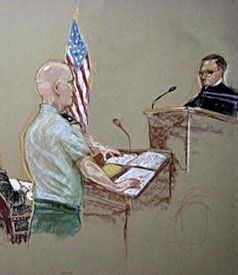
|  |  |  Americas & Beyond | July 2008 Americas & Beyond | July 2008  
First Guantanamo War Crimes Trial Under Way
 Jim Loney - Reuters Jim Loney - Reuters
go to original


| | June 2007 arraignment of Salim Ahmed Hamdan at a US military tribunal at Guantanamo Bay, Cuba. (Janet Hamlin/Reuters) | | |
Guantanamo Bay US Naval Base, Cuba - The first U.S. war crimes trial since World War Two began on Monday at the U.S. navy base in Guantanamo Bay, Cuba, nearly seven years after the September 11 attacks prompted President George W. Bush to declare war on terrorism.

Osama bin Laden's former driver, Salim Ahmed Hamdan, faces charges of conspiracy and providing material support for terrorism and could face life in prison if convicted by a jury of U.S. military officers.

"This military commission is assembled," judge Keith Allred said after the potential jurors were sworn in.

"You must make your determination whether or not he is guilty based solely on the evidence presented here in court and the instructions I will give you," Allred instructed jurors. "You must impartially hear the evidence."

The first trial in the controversial war crimes court got underway 6-1/2 years after the United States opened the prison camp in Cuba to jail suspected al Qaeda and Taliban fighters.

Prosecutors contend Hamdan, a Yemeni in his late 30s, was close to al Qaeda's inner circle and was on the way to a battle zone with two surface-to-air missiles in his car when he was captured in November 2001, shortly after the U.S.-led invasion of Afghanistan.

Hamdan's lawyers say he is not a member of al Qaeda, and was merely a driver and mechanic in bin Laden's motor pool who needed the $200 monthly salary.

Hamdan is being tried in a hilltop courthouse overlooking Guantanamo Bay by a jury selected from a pool of 13 U.S. military officers flown in from around the world. The panel must be comprised of at least five members.

Human Rights Questions

Human rights advocates have complained about the conditions under which approximately 265 prisoners are held at the Guantanamo prison and about the legal system the Bush administration constructed after the September 11 attacks to try those charged with crimes.

The Guantanamo naval base became a lightning rod for anger against and criticism of the United States as detainees, held for years without charge and denied the rights accorded to formal prisoners of war, complained of torture and abuse.

Defense lawyers also say much of the evidence against their clients may have been extracted through coercion.

Just before the start of trial, Allred granted Hamdan's defense team a partial victory by throwing out some of his statements to interrogators but allowed other statements to be entered as evidence.

Allred said he was suppressing Hamdan's statements made at the U.S. base at Bagram, and those made in the Panjsher Valley, both in Afghanistan.

Only one case at Guantanamo has been resolved. Australian captive David Hicks pleaded guilty to providing material support for terrorism in a deal that averted a trial and limited his sentence to nine months in prison.

Among the other detainees at the Guantanamo prison camp are alleged September 11 plotters Khalid Sheikh Mohammed, Ali Abdul Aziz Ali, Ramzi Binalshibh, Mustafa Ahmed al-Hawsawi and Walid bin Attash.

They are charged with conspiring with al Qaeda to murder civilians in the 2001 attacks that launched the global war on terrorism and with 2,973 counts of murder, one for each person killed when hijacked passenger planes slammed into the World Trade Center, the Pentagon and a Pennsylvania field.

Lawyers for Hamdan plan to call Mohammed and bin Attash as witnesses in his trial to support his contention that he was not a member of al Qaeda.

(Editing by Michael Christie and Patricia Zengerle.) |

 |
|  |



